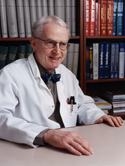| Abstract: |
Introduction: Concurrent signal transduction inhibition with the epidermal growth factor receptor (EGFR) inhibitor gefitinib and the mammalian target-of-rapamycin inhibitor everolimus has been hypothesized to result in enhanced antitumor activity in patients with non-small cell lung cancer (NSCLC). This phase II trial assessed the efficacy of the combination of gefitinib and everolimus in patients with advanced NSCLC. Methods: Two cohorts of 31 patients with measurable stage IIIB/IV NSCLC were enrolled: (1) no prior chemotherapy and (2) previously treated with cisplatin or carboplatin and docetaxel or pemetrexed. All patients received daily everolimus 5 mg and gefitinib 250 mg. Response was assessed after 1 month and then every 2 months. Pretreatment tumor specimens were collected for mutation testing. Results: Sixty-two patients were enrolled (median age: 66 years, 50% women, 98% stage IV, all current/former smokers, and 85% adenocarcinoma). Partial responses were seen in 8 of 62 patients (response rate: 13%; 95% confidence interval: 5-21%); five responders had received no prior chemotherapy. Three partial responders had an EGFR mutation. Both patients with a KRAS (G12F) mutation responded. The median time to progression was 4 months. Median overall survival was 12 months, 27 months for no prior chemotherapy patients, and 11 months for patients previously treated with chemotherapy. Conclusions: The 13% partial response rate observed did not meet the prespecified response threshold to pursue further study of the combination of gefitinib and everolimus. The response rate in patients with non-EGFR mutant tumors was 8%, likely reflecting activity of everolimus. Further investigation of mammalian target-of-rapamycin inhibitors in patients with NSCLC with KRAS G12F-mutated tumors is warranted. Copyright © 2010 by the International Association for the Study of Lung Cancer. |
| Keywords: |
adult; cancer survival; clinical article; human tissue; treatment outcome; treatment response; aged; aged, 80 and over; middle aged; antibiotic agent; survival rate; gene mutation; overall survival; exon; gene deletion; mutation; proto-oncogene proteins; clinical trial; constipation; fatigue; histopathology; salvage therapy; carcinoma, squamous cell; bevacizumab; cisplatin; cancer combination chemotherapy; cancer growth; diarrhea; drug dose reduction; hypophosphatemia; side effect; gemcitabine; cancer patient; cancer staging; neoplasm staging; anorexia; adenocarcinoma; carboplatin; sensory neuropathy; cohort studies; anemia; lung non small cell cancer; nausea; thrombocytopenia; vomiting; antineoplastic combined chemotherapy protocols; carcinoma, non-small-cell lung; lung neoplasms; weight reduction; smoking; steroid; receptor, epidermal growth factor; docetaxel; backache; coughing; dyspnea; fever; lymphocytopenia; pneumonia; pruritus; rash; hyponatremia; survival time; lung adenocarcinoma; gefitinib; headache; phase 1 clinical trial; ras proteins; lung squamous cell carcinoma; navelbine; clinical trials, phase i as topic; dry eye; dry skin; quinazolines; epistaxis; pemetrexed; everolimus; non-small cell lung cancer; leg edema; sirolimus; dysgeusia; desquamation; mouth ulcer; international normalized ratio
|














